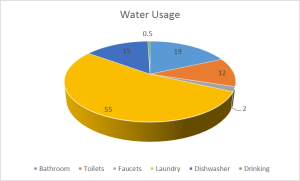The water supply for my home is not connected to any municipal sources because of its location in a rural area. My family has several wells on the property for both residential and farm use. The ground water is around 70 feet below the surface and is completely potable. The well for our house recharges from natural drainage from the 40+ inches of rain received in Erie County every year. That water is pumped with an electric pump into my house where it is used for drinking, cleaning, showering, and etc. The gray water from the house is disposed of into our leech bed which infiltrates water into the ground. The water drains through the soil back into the groundwater supply, thus completing a cycle. Some of this water is probably lost from runoff and evaporation, which means it ends up draining into French Creek or lost into the atmosphere. This is a fairly common setup for water in my area, where almost everyone has their own wells.
In my attempt to use only 2 gallons of water in a day, I realized how difficult that actually is. The areas of water use that I focused on were cooking, drinking, and hygiene. Immediately, I realized that showering was not a realistic possibility. Drinking water and cooking were the most important activities that required water, so I focused on satisfying those needs first. For hygiene, I decided to use a small amount of water to wash my face instead of showering, which greatly cut down on water use. I drank half a gallon, but I did not leave the sink running like I normal do. I used another gallon for cooking. I failed the experiment the first time I had to use the bathroom; that in itself uses more than 2 gallons. I did use just a fraction of my normal water use of around 100 gallons. Geography is relevant to water use because of the unequal distribution of water supply and use across the Earth’s landscape. My area has more than enough water that can support my usage, but many places do not.


Hi
I found your blog interesting because of the majority of post that I’ve seen all talked about how their water sources were connected to municipal sources. I thought it was cool to hear something different, I knew that people used wells but I thought it was more interesting to hear that it was a whole farm. On another note I wanted to add that we picked the same priorities which it seems that most people did but I believe that happened because it was for us to see what we think we need to sustain our lives. This module definitely relates to the title of the course because of how we maintain our lifestyles and really opens our eyes to a more altruistic lifestyle rather than being selfish and really showing us that we do not need some of the things that we have because across the globe somebody is surviving off of very little of what we have.
I encourage you to check out my blog and what happened with my experiment here:
http://geog030.dutton.psu.edu/2016/02/10/andrea-garbrick-water-tracking-and-usage/